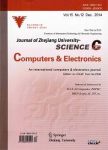Science Letters:Binary tree of posterior probability support vector machines
Science Letters:Binary tree of posterior probability support vector machines作者机构:Glorious Sun School of Business and Management Donghua University Shanghai 200051 China College of lnformation Engineering Xiangtan University Xiangtan 411105 China
出 版 物:《Journal of Zhejiang University-Science C(Computers and Electronics)》 (浙江大学学报C辑(计算机与电子(英文版))
年 卷 期:2011年第12卷第2期
页 面:83-87页
核心收录:
学科分类:0810[工学-信息与通信工程] 081203[工学-计算机应用技术] 08[工学] 0805[工学-材料科学与工程(可授工学、理学学位)] 0835[工学-软件工程] 0812[工学-计算机科学与技术(可授工学、理学学位)]
基 金:Project (Nos. 60874104 and 70971020) supported by the National Natural Science Foundation of China
主 题:Binary tree Support vector machine Handwritten recognition Classification
摘 要:Posterior probability support vector machines (PPSVMs) prove robust against noises and outliers and need fewer storage support vectors (SVs). Gonen et al. (2008) extended PPSVMs to a multiclass case by both single-machine and multimachine approaches. However, these extensions suffer from low classification efficiency, high computational burden, and more importantly, unclassifiable regions. To achieve higher classification efficiency and accuracy with fewer SVs, a binary tree of PPSVMs for the multiclass classification problem is proposed in this letter. Moreover, a Fisher ratio separability measure is adopted to determine the tree structure. Several experiments on handwritten recognition datasets are included to illustrate the proposed approach. Specifically, the Fisher ratio separability accelerated binary tree of PPSVMs obtains overall test accuracy, if not higher than, at least comparable to those of other multiclass algorithms, while using significantly fewer SVs and much less test time.



